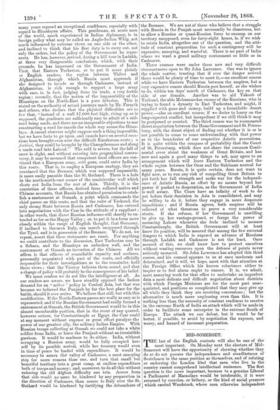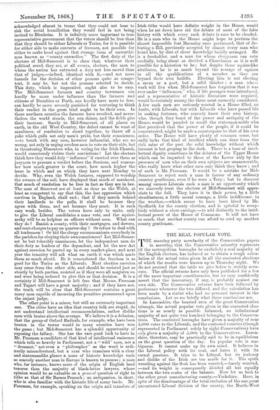MID-SOMERSET.
THE last of the English contests will also be one of the most important. On Monday next the electors of Mid- Somerset will have the opportunity of showing whether they do or do not possess the independence and steadfastness of Scotchmen in the same position as themselves, and of refuting or endorsing the London libel that men who live in the. country cannot comprehend intellectual eminence. The first question is the more important, because to a genuine Liberal a Parliament of Macaulays would be intolerable, if it were returned by coercion, or bribery, or the kind of social pressure which carried Woodstock, where men otherwise independent
acknowledged almost in terms that they could not bear to risk the social humiliation they would feel in not being invited to Blenheim. It is infinitely more important to true representative government that the voters should be free than that they should be either Liberals or Tories, for it is possible for either side to make converts of freemen, not possible for either to make head against that strange form of unworthi- ness known as "county cowardice." The first duty of the electors of Mid-Somerset is to show that, whatever their political, creed, they are, at all events, electors, the men to whom the nation has entrusted a duty not less sacred than that of judges,—indeed, identical with it,—and not mere funnels for the decision of other persons quite as compe- tent, it may be, but not the persons selected to decide. This duty, which is imperative, ought also to be easy. The Mid-Somerset farmers and country townsmen can hardly be more under influence than the farmers and citizens of Dumfries or Perth, can hardly have more to fear, can hardly be more severely punished for venturing to think their verdict in the great trial ought to be their own. In those northern counties the farmers have revolted, and never- theless the world stands, the sun shines, and the fields give their increase. Surely in Mid-Somerset, of all places on earth, in the old West Country, the defect cannot be want of manliness, of resolution to stand together, to throw off a yoke which galls not only men's pride, but their consciences, —to break with any men, however influential, who see no wrong, not only in urging careless men to vote on their side, but in threatening Dissenters who, in voting for the Irish Church, would consciously violate their convictions ? Let the electors think how they would defy " influence" if exerted over them as jurymen to procure a verdict before the Sessions, and remem- ber how much greater is the court, how much higher the issue in which and on which they have next Monday to decide. Why, even the Welsh farmers, supposed to worship the owners of the soil, have displayed that much of manhood, that much of resolution to be free in fact as they are in law. The men of Somerset are at least as dour as the Welsh, at least as competent to say that this, the last oppression which survives in England, shall end ; that if they march behind their landlords to the polls, it shall be bemuse they agree with them, and not because they must. It is such easy work, besides. The voters have only to unite, only to give the Liberal candidates a masa vote, and the squire- archy will be as helpless as officers without men. What can they do ? Banish a county, with their mortgages, and dowers, and rent-charges to pay on quarter-day ? Or refuse to deal with all tradesmen ? Or bid the clergy excommunicate everybody in the parishes for obeying their own consciences? Let Mid-Somer- set be but tolerably unanimous, let the independent men do their duty as leaders of the dependent, and let the new Act against coercion be pasted up in every market-place, and next year the tenantry will ask what on earth it was which made them so much afraid. Be it remembered the freedom is as good for the Tories as the Liberals. Next election coercion may come from the other side, and should be resisted just as stoutly by both parties, resisted as if they were all magistra'-es, and were being ordered to give this or that decision. It is a certainty if Mid-Somerset is left free that Messrs. Freeman and Tagart will have a great majority ; and if they have not, the truth will be clear that Mid-Somerset contains a great many men capable of incurring the penalties pronounced upon the unjust judge.
The other point is a minor, but still an extremely important one. The cities have an idea that country folk are stupid, do not understand intellectual recommendations, rather dislike men with brains above the average. We believe it is a delusion, that the group of Oxford Radicals, for example, who have been beaten in the towns would in many counties have won the game ; but Mid-Somerset has a splendid opportunity of exposing the fallacy. She has the rare good luck to have in Mr. Freeman a candidate of that kind of intellectual eminence which tells so heavily in Parliament, not a " wild" man, not a " dreamer," not even a "philosopher" as the word is ordi- narily misunderstood, but a man who examines with a clear and statesmanlike glance a mass of historic knowledge such as scarcely another man in Europe is known to possess ; a man who, for instance, knows more of the origin of English land tenures than the majority of black-letter lawyers, whose opinion would be as valuable on a general question of right to tithe as that of Sir Barnes Peacock ; an antiquarian, in short, who is also familiar with the historic life of many lands. Mr. Freeman, for example, speaking on the origin and transfers of
Irish tithe would have definite weight in the House, would when he sat down have rid the debate of most of the false history with which every such debate is sure to be clouded. He is a man who in the House might hope to perform the almost impossible feat Macaulay once performed, that of de- feating a Bill, previously accepted by almost every man who heard him, by dint of sheer knowledge lucidly arranged. He is a freeholder, and a man for whom clergymen can vote cordially, being about as decided a Churchman as it is well possible for a historian to be ; but despite those squire-like attributes, he is as much beyond the average of squires in all the qualifications of a member as they are beyond their own bailiffs. Electing him is not electing a savan or a poet, but a solid thinker ; a man whose work will live when Mid-Somerset has forgotten that it was ever under " influences," who, if life peerages were introduced, and a representative of historic literature were required, would be certainly among the three most earnestly considered. A few such men are seriously wanted in a House filled, no doubt, with Liberals, but with Liberals who have passed life in making fortunes, who scarcely know their own history, who, though they boast of the power and antiquity of the House, would be puzzled to recall the statesman-noble who first perceived that the power of the people, if it could be concentrated, might be made a counterpoise to that of his own order. The House will have plenty of common sense, but sadly lacks that kind of intellect which can draw from the rich mine of the past the solid knowledge without which forecast is but groping in the dark. There is a tone of intel- lectual dignity sometimes in the debates of the Upper House which can be imparted to those of the Lower only by the presence of men who on their own subjects are unanswerable, who really know what other men only think they know ; and of such is Mr. Freeman. It would be a mistake for Mid- Somerset to reject such a man in favour of any ordinary country gentleman, even if he were a Tory ; but to discover among earnest Liberals such a man is an opportunity which we sincerely trust the electors of Mid-Somerset will appre- ciate to the full. They have it in their power, by a little steadfastness, a little moral courage, a little indifference to the weather,—which seems to have been hired by Mr. Spofforth for the county election, and is spiteful to every- body without a close carriage,—to add distinctly to the intel- lectual power of the House of Commons. It will not have so much, that another county can afford to send up another county gentleman.







































 Previous page
Previous page